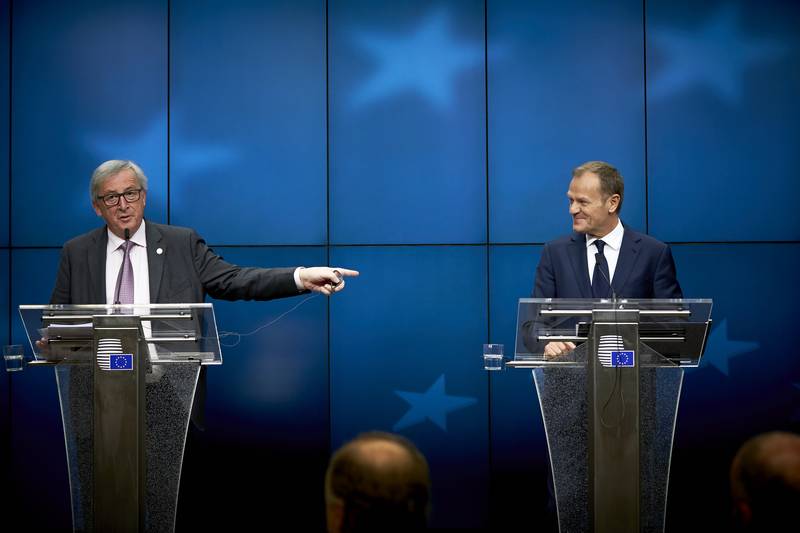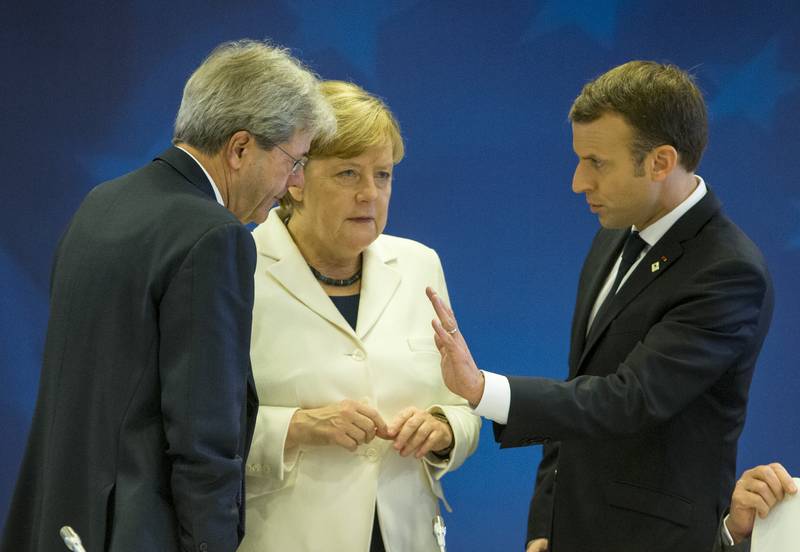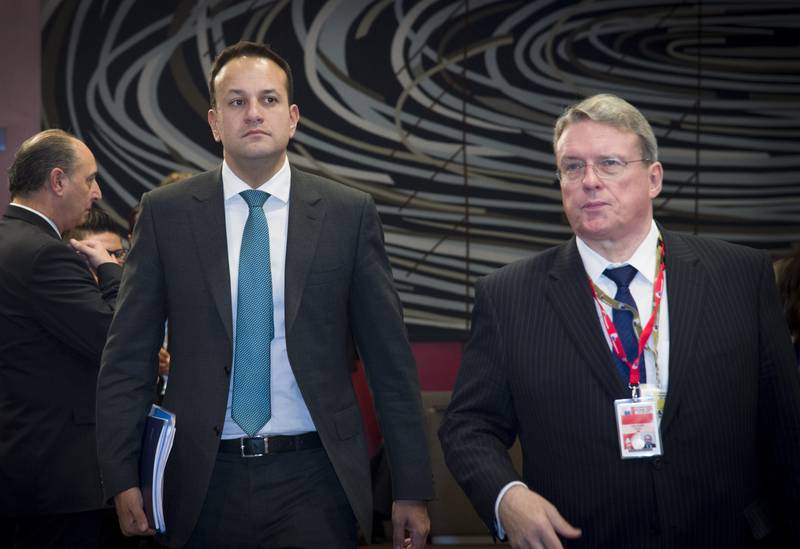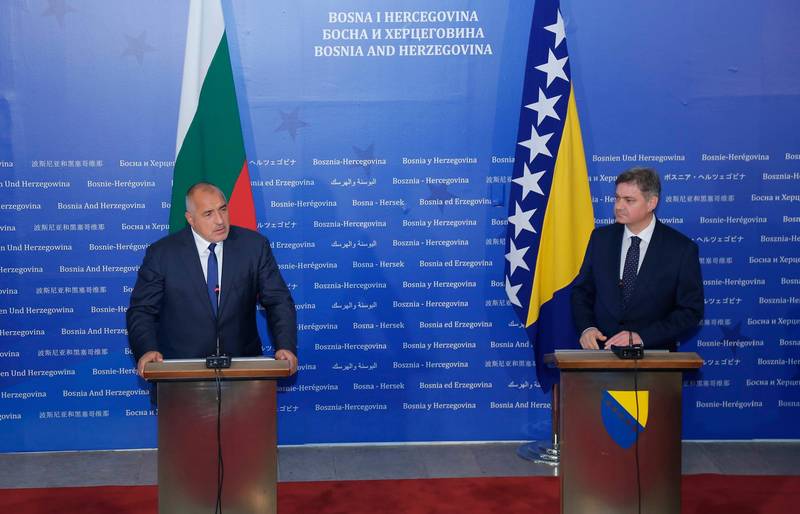A Power Struggle in the EU
Adelina Marini, October 19, 2017
 A change of the centre of power is cooking in the European Union. And this is far from a good news for the Union, as it bodes its transformation into something very different from what it is now - a community in which the supranational and national interests are balanced so as to preserve unity and, above all, equality. If the plan of European Council President Donald Tusk (Poland, EPP) comes into fruition, this balance will be breached, which will hurt the smaller member states, but citizens as well, as the transparency, which is a cause for criticism even now, will decrease significantly. One of the items on the agenda of the October EU summit is discussing the leaders' agenda for the next two years as well as a change in working methods. What Mr Tusk suggests to leaders is an European Council which takes matters into its own hands.
A change of the centre of power is cooking in the European Union. And this is far from a good news for the Union, as it bodes its transformation into something very different from what it is now - a community in which the supranational and national interests are balanced so as to preserve unity and, above all, equality. If the plan of European Council President Donald Tusk (Poland, EPP) comes into fruition, this balance will be breached, which will hurt the smaller member states, but citizens as well, as the transparency, which is a cause for criticism even now, will decrease significantly. One of the items on the agenda of the October EU summit is discussing the leaders' agenda for the next two years as well as a change in working methods. What Mr Tusk suggests to leaders is an European Council which takes matters into its own hands.
What is the European Council?
It is the institution that brings together the leaders of the member states and which has evolved significantly over the years. The European Council was not part of the initial construction of the European community. At the beginning, it started as an informal gathering of leaders, but the great economic crisis of the 1970s prompted them in taking up a personal approach to the most urgent problems. The need of presidents and prime ministers to meet regularly has led to the institutionalization of these meetings. This happened at the Paris summit in December 1974, when the European Council evolved from an informal summit format into a political body.
Over the years, its importance has steadily risen, with the body gaining the most authority with the Treaty of Lisbon, which entered into force in 2009. It was with this treaty that the European Council became a full-fledged institution with its own Chairman. Ministers and permanent representatives dropped out of attendance at its meetings. Prior to Lisbon, the leadership of the European Council was in the hands of rotating presidencies, but this proved to be ineffective as each presidency tried to push its priorities and the general direction was lost. The European Council does not have an official legislative role, but over the years of the severe financial crisis and the subsequent debt crisis in the euro area, the body has started to deal increasingly with the EU's everyday tasks, thus taking away power from the body which is supposed to be making decisions on current legislative proposals - the Council of Ministers.
Currently, the legislative process streams from the European Commission to the Council of Ministers, but passes through the European Council for approval. The Commission comes up with a proposal, often in the form of a communication, first endorsed by the European Council, and then the Commission makes it a legislative proposal, which it sends for discussion to the Council and the European Parliament, which often has co-legislative functions and sometimes only needs to be consulted. Once the discussions in the Council have been finalized and the European Parliament has given its approval, the proposal becomes a law. Decisions in the Council are usually taken by unanimity, but it is also possible to vote by a qualified majority. This is a way to circumvent the blockades, as was the case with the refugee redistribution quotas.
In more and more cases, the European Council is taking matters into its own hands, such as approving the bailout programmes for Greece and other countries that needed rescuing. Otherwise, the European Council's main function is to provide guidance for the future. It is the leaders who agree to take a new integration step, as was the case with the banking union in more recent times. The migration crisis, as well as the clash with Euroscepticism, has brought the Union to a new dilemma - how to move forward. In Bratislava, everyone once again pledged allegiance to the European project, but some want to integrate more, while others want links to be looser, so that nation states retain more of their sovereignty. This leads to a blocking of any next steps.
On March 25, on the occasion of the 60th anniversary of the signing of the Treaty of Rome, a declaration was adopted, which in fact laid the foundations for a multi-speed Europe. So far, the question stood of exactly how is this going to be implemented.
What is Donald Tusk suggesting?
 The president of the European Council believes that there is currently a discrepancy between the stated unity and the dynamics that is being shown in the construction of the EU. Therefore, he suggests speeding up work on some legislative decisions that are likely to be stuck in the Council of Ministers for years, and there are many examples of such slowdowns. The most recent one being the creation of the European Public Prosecutor's Office, which has been stuck in the Council for four years until, finally, one of the instruments for a multi-speed Europe - the enhanced cooperation procedure - was used. This procedure allows for a minimum number of countries (9) to take their own path if there is no agreement among the others. In this case, however, the European Council did not have to intervene, except to approve the request to move to an enhanced cooperation procedure.
The president of the European Council believes that there is currently a discrepancy between the stated unity and the dynamics that is being shown in the construction of the EU. Therefore, he suggests speeding up work on some legislative decisions that are likely to be stuck in the Council of Ministers for years, and there are many examples of such slowdowns. The most recent one being the creation of the European Public Prosecutor's Office, which has been stuck in the Council for four years until, finally, one of the instruments for a multi-speed Europe - the enhanced cooperation procedure - was used. This procedure allows for a minimum number of countries (9) to take their own path if there is no agreement among the others. In this case, however, the European Council did not have to intervene, except to approve the request to move to an enhanced cooperation procedure.
After numerous consultations with the leaders of member states, Tusk has determined that there is readiness to speed up work, so as to “overcome the sense of powerlessness, where political interests, or bureaucratic inertia, stand in the way of achieving results”. To achieve this, he suggests that the most sensitive topics be placed on the table and, if necessary, more summit should be held. So far, practice has been that the most contentious topics are avoided in order to maintain the image of unity, especially given the need for it in the UK's exit talks. And the toxic topics are far from a few. In addition to the migration crisis, and above all the burden sharing among all, the EU is facing a major reform of the euro area, which will start in December, but it is certain that some member states, especially Central European ones, will try to block it.
In the invitation letter to leaders, Donald Tusk says that another reason for proposing that the European Council takes things in its own hands is the conflict of interest among leaders and their governments when it comes to substance or determination to overcome a deadlock. He proposes to put an end to the prolonged drafting of conclusions, which often rests only on the change of this word or that. He proposes that all contentious topics be organized in decision notes that will clearly set out the differences and the scale of conflict and this will be the starting point for political talks.
If the first talks fail, then it will be decided whether to make a second attempt or move directly to a second integration speed, namely the enhanced cooperation procedure.
Why?
The reasons given by Donald Tusk are only part of the motivation behind this proposal. There are several other issues - coalition governments and opportunistic states. It is quite often that legislative proposals stall in the Council due to personal interests of one minister or another. Occasionally, the reason for a deadlock is a lack of understanding in coalition governments, which leads to blockades by a minister from a disagreeing party in the Council. This problem can be considerably exacerbated by the formation of a coalition government in Germany, the talks on which have already begun between the Free Democrats, Liberals and Greens. Each of these parties, however, has its own views on certain topics and although it is possible to make concessions, it will not be on all subjects. The Council will be a good place for them to conduct their own party line. Coalition shocks could also come from Austria, where Eurosceptics and far-right parties won the election this month as well, and a coalition government is expected.
The problem with opportunist governments is also quite great, especially on the part of Poland, which literally wages war against unity in the EU. The country has managed to block decision-making in the Council and the European Council on several occasions. In the Council, the Poles, together with the Hungarians, refused to take part in the legislation governing property disputes between cross-border couples, including gay marriages and cohabitation. Budapest and Warsaw refused to participate in the European Public Prosecutor's Office. At the European Council level, Polish Prime Minister Beata Szydło blocked European Council conclusions as a form of protest against the re-election of Donald Tusk for a second term. Also quite indicative was the Warsaw statement that it supports Turkey's accession to the EU two days before the beginning of the summit, during which relations with Turkey were to be discussed. There is open talk in the EU about about ending talks with Turkey.
There is another reason behind Donald Tusk's decision - his conflict with European Commission President Jean-Claude Juncker (Luxembourg, EPP), which the two of them have been hiding for a long time, but has recently started to emerge more and more often. Earlier this year, Mr Juncker joked at a press conference during a European Council that he had from the very beginning been coveting Tusk's post. He had a hard time stepping into the shoes of a boss of a bureaucratic institution like the Commission, and has therefore announced that he will make it into a political one, and to a great extent he succeed. This, however, led to a competition between the two institutions. The culmination came when Jean-Claude Juncker announced in his state of the Union address that he wants the posts of the European Commission and the European Council to merge.
Together with his ideas for the future of Europe, Juncker also published a working schedule. With the papers Mr Tusk published unusually late (on Tuesday evening), he appears to be striking back. Apart from his idea of seizing governing powers from the hands of the Council, Tusk also publishes his own agenda, which differs from that of Juncker.
A risk for EU balance
Tusk's proposal may, at first glance, appear harmless, as the stated goal is to do more work and to use the accumulated energy for change, but this poses risks to the balance of power within the EU. The Council ensures the equality of all member states, whether small or large, whether influential or not. In the Council, each vote has a certain weight that is calculated to keep larger countries from imposing their positions on smaller ones. The European Council does not have such a voting system, and there the real weight of states and their leaders is what counts.
There is also a risk for transparency. The Council works much more transparently, publishing documents from preparation, sometimes meetings are public and are livestreamed on the internet, there are also reports on who voted and how. The work of the Council is coordinated by the Presidency, which, in an enhanced role of the European Council, will be completely sidelined. This concern is already shared by diplomats who have also expressed concern about the way documents will be prepared for approval - whether it will be done by Sherpas alone, who are all purely political figures, or will it again pass through Coreper 1 and 2. Coreper 1 is the format in which deputy heads of the permanent representations of the member states meet. It is concerned with the preparation of the work of the Agriculture and Fisheries Councils, for Competitiveness, Education, Social Policy and Health, Transport and Energy.
In Coreper 2, the Permanent Representatives of member states meet. They prepare the work of the Economic and Financial Affairs Council (ECOFIN), the Foreign Affairs, General Affairs, Justice and Home Affairs Councils. Both formats meet every week. The question arises as to how and by whom the so-called decision notes will be prepared.
Tusk's leaders' agenda provides for a euro area summit to take place in December when the timeline for decision-making on the deepening of euro area integration and completing the banking union will be approved. Tusk's ambition is to make concrete decisions to reform the euro area in June 2018. The European Council meeting on 14-15 December will tackle the launch of the Permanent Structured Cooperation (PESCO) and will make a comprehensive overview of the various defence initiatives that are being worked upon.
(PESCO) and will make a comprehensive overview of the various defence initiatives that are being worked upon.
The February summit will focus on institutional affairs such as the composition of the European Parliament and the first time negotiation of a transnational list, which is to be used in the very next European elections in 2019. According to plan, the final decision on the European elections and the transnational list is to be made in June. The February informal summit will also discuss the next multiannual budget. In March, Tusk proposes making important decisions on trade agreements with third countries and the strengthening of the single market. His calendar also includes an EU summit with the Western Balkans (17 May), which will take place in Sofia.
The June programme also includes an ambition to reach a final agreement on the migration crisis both externally and internally. This will probably be D-Day to put an end to this permanent source of division into the EU. The programme covers two years - 2018 and 2019, when controversial and large-scale issues will be the main ones to be presented to leaders’ attention. It shows that the number of informal summits, that end with no conclusions, will be increased, meaning we will not know exactly what is agreed on.
Leaders' reaction is a positive one. Polish Prime Minister Beata Szydło said before the start of the summit on Thursday that to Poland the most important condition is that everything is discussed in Brussels, during summits, and not in small groups. "I hope that President Tusk will ensure that the important issues will be discussed at the meeting, that all countries present will participate equally in the process". The most important problems for Poland in the EU are migration and the Nord Stream 2 gas pipeline project. She wants these two issues to be resolved first. "These are my conditions on behalf of the Polish government", Ms Szydło added.
Croatian Prime Minister Andrej Plenković sees no risk in Donald Tusk's proposal that the European Council take things into its own hands. "On the contrary, [...] The idea is that the format for the future of Europe, of possible heavy integration, remains common. This is the key. Tusk is, in a sense, a guardian of the format, as the Commission is the guardian of the treaties, so that the debate about the future of the Union does not slip away into a narrow circle of countries, where others will not even know where it is being held”, Mr Plenkovic explained. Frequent summits are being meant, especially between France and Germany, when decisions are being taken about the future, which are then offered to other leaders for approval. However, the Visegrad countries also meet regularly before summits to coordinate their positions. Other groupings have also happened.
Bulgarian Prime Minister Boyko Borissov said that the European Council is making decisions as it is. He saw nothing special about this proposal. However, the European Parliament wants to be the central forum for discussing the future of Europe. President Antonio Tajani (EPP, Italy) said a decision has been made to hold a series of debates in plenary hall about the future of Europe, to which both the leaders of member states and leading European figures will be invited. Regarding the leadership programme, he noted only the plans for the European elections and, in particular, the nomination procedure for candidates for a European Commission leader. "I'm sure your goal is to make this procedure a norm", he said.
Translated by Stanimir Stoev
 Gentiloni, Merkel, Macron | © Council of the EU
Gentiloni, Merkel, Macron | © Council of the EU Leo Varadkar | © Council of the EU
Leo Varadkar | © Council of the EU Boyko Borissov, Denis Zvizdic | © GIS
Boyko Borissov, Denis Zvizdic | © GIS Federica Mogherini | © Council of the EU
Federica Mogherini | © Council of the EU | © Council of the EU
| © Council of the EU Luis De Guindos | © Council of the EU
Luis De Guindos | © Council of the EU